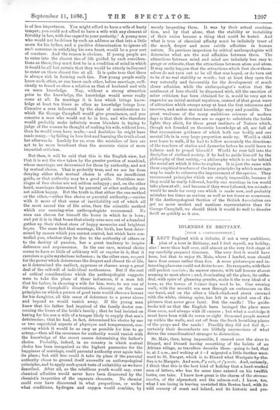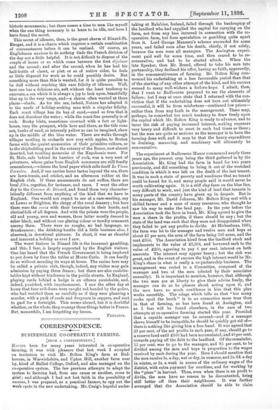I LEFT England with a definite, if not a very ambitious,
plan of a tour in Brittany, and I find myself, my holiday, alas ! more than half over, still almost at the very first stage of my carefully prepared itinerary. The very first it would have been, but that to enjoy St. Malo, where I landed, man should have four senses rather than five. A more picturesque and in- teresting place one could not desire to see. Its ramparts, with their still perfect enceinte ; its narrow streets, with tall houses almost seeming to meet above ; and, dominating all the place, its cathe- dral, with spire of gleaming granite, make it the very ideal of a town, as the towns of former days used to be. One evening walk, with the moonlit sea seen through an embrasure on the one hand, and on the other a black-shadowed street crowned with the white, shining spire, has left in my mind one of the pictures that never grow faint. But the smells ! The guide- books tell us that the English have besieged the place more than once, and always with ill success ; but what a maltbolgo it must have been with its seven or eight thousand people mewed up within the walls, and cut off from the fresh breathing-places of the quays and the sands ! Possibly they did not feel it,— certainly their descendants are blithely unconscious of what drives the unacclimatised stranger to distraction.
St. Malo, then, being impossible, I crossed over the river to Dinard, and Dinard having something of the habits of an African village, as travellers describe them—going to bed, that is, at 2 a.m., and waking at 4—I migrated a little further west- ward to St. Enogat, which is to Dinard what Westgate-by-the- Sea is to Margate. And now, Ty 8241.8, et j'y reale. And, seriously, I think that this is the best kind of holiday that a hard-worked man of letters, who has for some time entered on his twelfth lustre, can take. I know how great is the charm of the strenua inertia, of the alpenstock and the salmon-rod ; I know, too, what I am losing in leaving unvisited this Breton land, with its wild scenery of coast and inland, and its historic and pm.
historic monuments ; but there comes a time to men like myself when the one thing necessary is to learn to be idle, and here I have found the secret.
This secret of idleness, then, is the great charm of Dinard-St. Enogat, and it is a charm which requires a certain combination of circumstances before it can be realised. Of course, an Englishman anxious to do nothing finds the French division of the day not a little helpful. It is not difficult to dispose of the couple of hours or so which come between the first dqsetner and the second ; and after the second, when he has had his half-bottle of claret, or pint or so of native cider, he feels as little disposed for work as he could possibly desire. But something more than this is wanted, f..ar it is quite possible to be dull without reaching this rare felicity of idleness. Well, here one has a delicious air, soft without the least tendency to enervate, a sea which it is always a joy to look upon, beautifully blue up to the very verge, and—a charm often wanted at these places—shade. As for the sea, indeed, Nature has adapted it to the needs of holiday-seeking man with a singular felicity. Each coast village has its bay of sand,—sand so firm that it does not discolour the water ; while the coast-line generally is of rock. Rocky islets, sometimes crowned with a fort or light- house, vary the prospect, while here and there, as the tide runs out, banks of sand, as intensely yellow as can be imagined, show up in the middle of the blue water. There are walks through villages nestling in orchards now rosy with apples, to Breton farms with the quaint accessories of their primitive culture, or to the shipbuilding yard in the estuary of the Rance, now almost deserted, but recalling memories of the Napoleonic wars. For St. Malo, safe behind its barriers of rock, was a very nest of privateers, whose gains from English commerce are still fondly remembered,—witness the local paper which calls itself Le Vieux Corsaire. And, if one carries home tastes beyond the sea, there are lawn-tennis, and cricket, and an afternoon rubber at the English club. If these amusements do not suffice, there are local flees, regattas, for instance, and races. I went the other day to the Courses de Dinard, and found them very character- istically different from anything of the kind that we have in England. One would not expect to see at a race-meeting, say at Lewes or Brighton, the clergy of the rural deanery ; but here there were the cures with their breviaries in their hands, and clerical folk of all degrees. And with the priests were the people, old and young, men and women, these latter mostly dressed in sober black, and without one glaring colour or tawdry ornament among them. There were no roughs, no bad language, no drunkenness ; the drinking-booths did a little business also, I observed, in devotional pictures. In short, it was as cheerful and innocent a holiday as ever I saw.
The worst feature in Dinard life is the incessant gambling, and this, I fear, is largely supported by the English visitors. One has heard that the French Government is being implored to put down by force the tables at Monte Carlo. It can hardly do so without mending its ways at home. The casino here may be called a private club, though, indeed, any visitor may gain admission by paying three francs ; but there are also roulette- tables kept without hindrance in the public streets. In England, playing cards behind a hedge is an offence punishable, and, indeed, punished, with imprisonment. I saw the other day at home that four evil-doers were caught red-handed by the police, who had watched them as carefully as if they were planning a murder, with a pack of cards and fivepence in coppers, and sent to gaol for a fortnight. This seems absurd, but it is doubtful whether, on the whole, they manage these things better in France. Bat, meanwhile, I am forgetting my lesson.
FERIATUS.



































 Previous page
Previous page